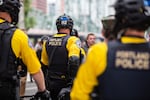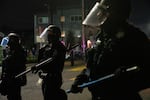Growing tension between Portland city officials and Department of Justice lawyers erupted during a public meeting Tuesday night, exposing a rift between the two agencies which could land the city back in federal court sooner than expected.
Department of Justice lawyers charged with overseeing the 2014 settlement agreement on how the Portland Police Bureau uses force and conducts officer oversight said the city has failed to explain how it plans to handle protests and use of force investigations in the future.
“We have asked for a plan of remediation and the city has not agreed to provide one,” assistant U.S. attorney Jared Hager said at a Tuesday evening meeting of the Portland Committee on Community-Engaged Policing. “If we don’t get a plan, and the noncompliance persists, then the only thing we can do is issue a notice under the enforcement provisions of the settlement agreement and try to get an action plan that we feel is sufficient that way.”

Portland police officers on bicycles at a white supremacist rally in Portland, Ore., Saturday, Aug. 17, 2019. The rally organized by the Proud Boys, labeled a hate group by the Southern Poverty Law Center, attracted militia members, white supremacists and neo-Nazis and carried the potential for violence.
Bradley W. Parks / OPB
Hager said it would be unfortunate to have to go that route.
If the DOJ issues a formal notice of noncompliance, it would send a letter to the city attorney and Portland’s chief of police, starting a 30-day clock for the city to respond. If the federal government’s concerns aren’t resolved, that would lead to a face-to-face meeting and then to mediation. Only after those efforts have failed would the issue be brought before the federal judge overseeing the agreement.
It would be the first time the DOJ felt the need to issue formal notice of noncompliance during the nearly seven years the agreement has been in place.
The settlement agreement took effect after a federal investigation found Portland officers were using excessive force on people with mental health needs. The Justice Department issued an update in February, citing failures across a number of sections encompassing use of force, training and officer accountability.
The use of force and accountability shortfalls stem from the more than 6,000 documented instances of police using force against protesters in 2020. PPB policy requires a use of force report to be filled out before an officer’s shift ends, and for that officer’s supervisor to review it for policy compliance within 72 hours.
That did not happen, according to the February report.
“Some supervisors validated uses of force with little or no critical assessment — even uses of force that were captured on video and replayed on news media, or later became subject to complaints,” the Justice Department report reads. “Validation of individual uses of force with little or no discussion of reasonableness of the force used or of de-escalation attempts, stands in contrast to PPB’s policy requirements for force investigations and PPB’s expressed organizational goals.”

Protesters gathered in front of the Portland Police Association on day 68 of protests against systemic racism and police violence.
Jonathan Levinson / Jonathan Levinson
The city claims it was overwhelmed by the protests last summer, an isolated event officials said is unlikely to happen again. Federal prosecutors disagreed and said PPB’s inability to follow its own policies has exposed a systemic failure within the bureau. Whereas prior to last summer, the city was steadily making progress toward mutually agreed upon goals, the summer’s events revealed gaping holes in an accountability system previously believed to be up to snuff.
“They say the demonstrations overwhelmed the system,” Hager told OPB following the meeting. “But it was PPB’s use of force, not the demonstrations, that revealed the city’s force reporting/reviewing systems and its accountability systems to be inadequate.”
After action reports from protests last summer reviewed by OPB show officers sometimes reporting dozens of use of force incidents during protests, but offering very little in the way of specifics.
A July 1 after action report describes the events surrounding nearly 120 uses of force as “Members assigned to (Portland police’s rapid response team) deployed 40mm munitions, hand-tossed (tear gas), hand-tossed (rubber ball distraction device), push/strikes baton, pepper spray and other forms of physical force upon those engaged in criminal activities at the protest.”
For each incident, even for cases where the subject was arrested or their name was known, the report states no subject statement was provided “based on the circumstances of the event.”
“Due to...the tactical dynamic in place with these significant events, I am unable to perform the standard duties of interviewing involved members at the scene,” a sergeant wrote in a July 29 report.
Lawyers for the Justice Department said this sort of corner cutting represents a massive problem with the bureau’s accountability system, which they must address to comply with the settlement agreement. An effective system isn’t effective if it only works during routine circumstances, they said.
On Tuesday night, during a tense exchange, Mary Claire Buckley, a civilian overseeing the Portland Police Bureau’s Office of Inspector General, bristled when Hager and his colleague, Assistant U.S. Attorney Jonas Geissler, said holding officers accountable for potentially unconstitutional use of force was a fundamental requirement in the settlement agreement, and that the city must take action if it is unable to handle the amount of force it chose to use.
“Jared, I don’t know what you’re talking about there because any allegation of excessive use of force that was brought to our attention was either taken to IPR or IA and is under administrative investigation,” Buckley fired back. “There is no allegation that we are not administratively investigating any allegation of excessive use of force.”
But the DOJ said it’s the long tail of the original sin – the failure to write detailed reports and conduct reviews within 72 hours – that the city must remedy.
“The problem with having failed in the system for investigation of force at the front end is that you starve the accountability system on the back end of necessary data to understand whether or not the force was constitutional,” Geissler told Buckley and the policing committee.
Buckley reminded committee attendees that while there were 6,000 uses of force during protests last summer, that does not mean they were unconstitutional. The argument prompted a harsh rebuke from Hager.
“The notion that all 6000-plus uses of force were constitutional is beyond belief,” he said. “Even if 99% were good, how can the city unearth the 1% and hold officers to account at this late stage? And 99% is way too generous an assumption if the force that was caught on video is any indication.”
Looming over this conflict is the new police oversight board passed by Portland voters in November. The board, which advocates say will have broad autonomy to investigate misconduct, discipline and fire officers, is supposed to replace the current system called the Independent Police Review, a battered organization in public opinion that critics argue has little power to hold officers accountable.
But it’s a complex transition for which the city, so far, does not have a plan.
“I don’t think they know what they’re going to do in terms of a transition from IPR to the new oversight board or what they’re going to do to manage force in the next crowd control situation where police might be the object of demonstration,” Hager said. “To think that this is unprecedented and it’ll never happen again, especially when what we’re talking about is the police choice to use force against demonstrations, I think is folly.”
If the city does design a transition plan, it will require DOJ’s approval under a settlement agreement that appears increasingly likely to remain in place for the foreseeable future.
